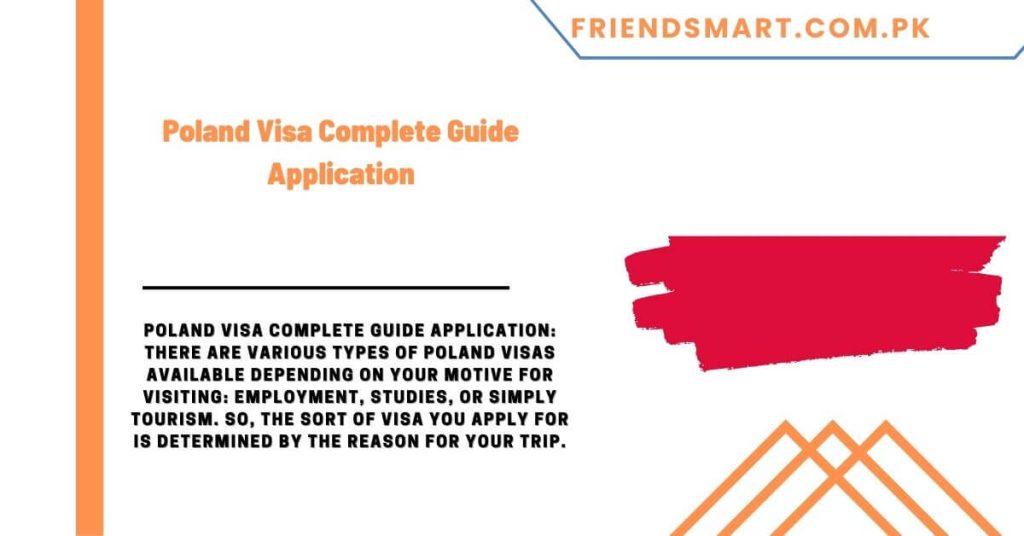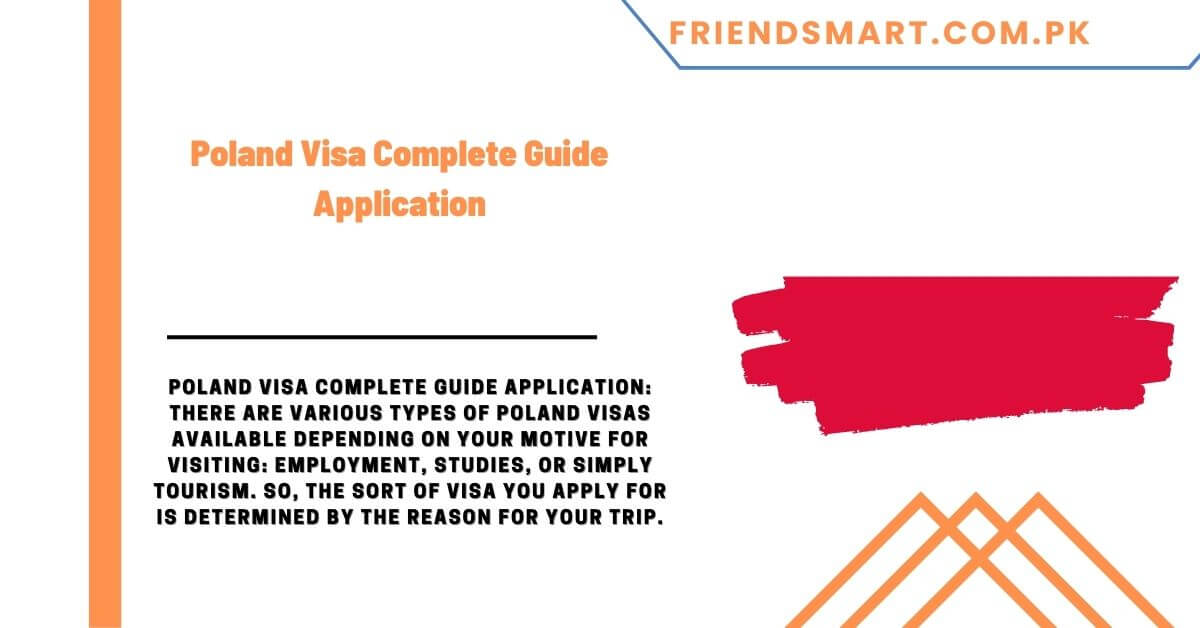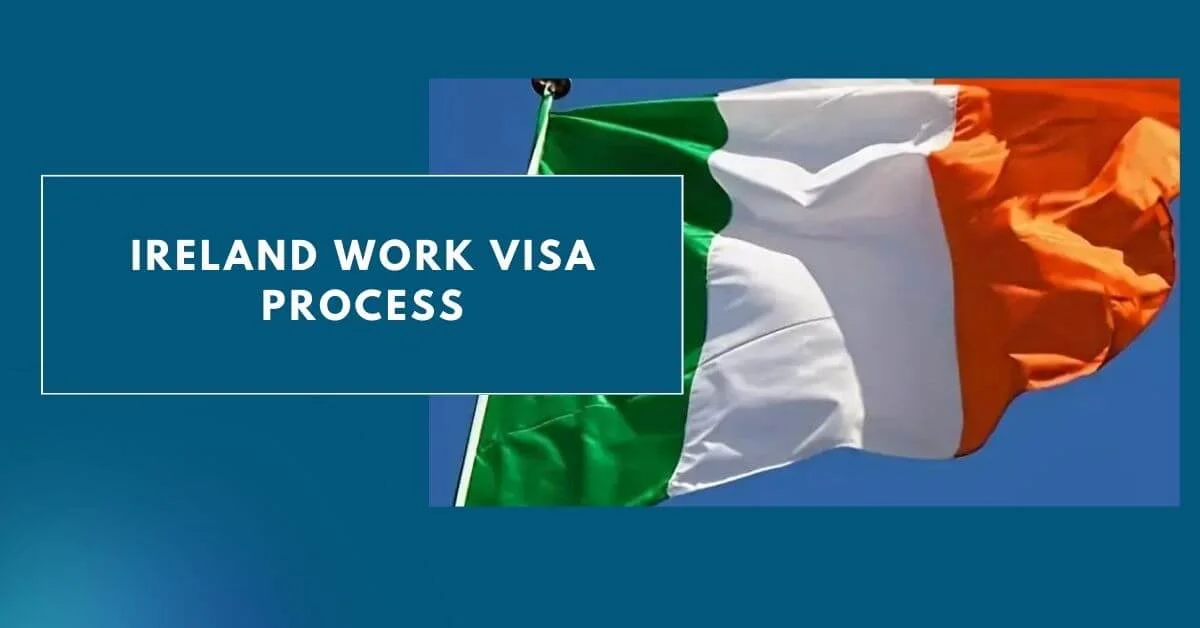Poland Visa Complete Guide Application: There are various types of Poland visas available depending on your motive for visiting: employment, studies, or simply tourism. So, the sort of visa you apply for is determined by the reason for your trip.
Read More: Do You Need a Passport to Go to Cancun
However, before applying for a visa, you must first determine whether you require one at all, and if so, you must understand how to apply for one.
Do I Need a Visa for Poland?
You do not need a visa for Poland if:
- Your country is a member of the EU/EEA or any Schengen country.
- Your home nation has a visa-free agreement with Schengen. Citizens from the United States, Australia, Canada, Georgia, Japan, New Zealand, South Korea, Thailand, and Tunisia are among those affected.
If you are visiting Poland from a country that does not have a visa-free agreement (such as India, China, Morocco, Thailand, Turkey, Egypt, and so on), you must apply for a visa.
Remember that even if you can visit Poland without a visa for short periods of time to work or study, everyone who is not an EU citizen must obtain a visa.

Types of Poland Visas
There are various types of Poland visas available depending on why you want to visit Poland. The categories of Poland visas are as follows:
Poland Schengen Visa. If you intend to stay in Poland for less than 90 days, you must obtain a Polish tourist visa. This visa is perfect if you want to visit Poland for tourism, business, or even medical treatment. It is known as a Schengen visa because it allows the holder to travel to all other Schengen nations during the validity period of the visa.
Poland Airport Transit Visa. The Polish airport transit visa permits the holder to access the international transit area of a Polish airport in order to change planes. It is intended for people flying to a third country but connecting to Poland. If they do not leave the international transit zone, they do not require a Polish transit visa.
Poland Work Visa. You must apply for a Polish work visa if you wish to work in Poland. You must have an employer that will make a work permit application on your behalf at the local Voivodeship office (the Polish equivalent of a municipal agency). Work permits are classified according to the duration and nature of your work. You can only begin working if your company issues you a work permit.
Poland Student Visa. If you are not from the EU and have been accepted to a university in Poland, you must apply for a Polish student visa and a student residency permit.
Poland Family Visa. If you wish to visit your spouse or parents in Poland, you must apply for a Polish family visa. The family visa is valid for two years and allows you to work in Poland during that time. Proof of family status, such as a marriage certificate (for spouses) or birth/adoption certificate (for minor children), is required.
Difference Between Poland Schengen Visa and Long-Term Visa
The differences between Poland Schengen Visa and a D-Type Long Term Visa are
| Poland Schengen Visa: | Poland D-Type Long Term Visa: |
| Is a short-stay visa | Is a long-stay visa |
| Your stay cannot exceed three months | Is issued for up to one year and can be extended |
| Recommended for travel | Recommended if you want to study and work in Poland |
| If you enter Poland with a Schengen visa, you will be unable to obtain a residence permit. | If you enter Poland with a long-stay visa, you can obtain a residence permit and stay for years or indefinitely. |
| A strong reason is not required to acquire a Schengen visa for Poland. | A compelling reason is required to acquire a long-stay visa. It could be a job contract, a letter of acceptance from a Polish university, or having a close family member who resides there. |
Poland Visa Application Process
To apply for a Polish visa, you must first:
- Contact the Polish embassy or consulate in your area. To submit an application, you must make an appointment with the embassy/consulate.
- Prepare your paperwork. The embassy/consulate will give you a list of the documents needed for your visa.
- Fill out the visa application. You may be required to attend a visa interview on the day of your appointment.
- Allow time for a decision to be made. It may take several weeks for your visa application to be processed, so apply well in advance of your trip.
Required Documents for a Polish Visa
When applying for a Poland Visa, you will require the following documents:
- Form for applying for a visa to Poland (Schengen). You must completely fill out the application form and sign it at the end.
- Two passport-sized pictures of yourself are required.
- A duplicate of your passport. Your passport must be valid for at least three months beyond the date of return.
- Travel health insurance documentation. You must have travel insurance that meets the Schengen visa criteria (€30,000 coverage throughout the Schengen area).
- The cover letter. You may be required to submit a letter stating the purpose of your travel, your plans in Poland, and so on.
- Proof of lodging in Poland. You must provide documentation such as a hotel reservation, an Airbnb booking, a note from a host, and so on.
- Evidence of sufficient funds to cover your stay in Denmark.
- Proof of your marital status. You must present a marriage certificate if you are married.
- Proof of your flight’s departure and arrival times. You can submit a flight reservation itinerary; you do not need to buy a ticket before your visa is approved.
- I paid the visa fee. If you are required to pay for the visa in advance, you must provide proof of payment.
- If you are currently employed, please send the following documents:
- Your employment contract
- Bank statement for the previous six months’ earnings
Processing Time for a Poland Visa Application
Your Poland visa application will take between 10 and 14 days to process. After this time range, the Polish embassy or consulate will respond. In some cases, the processing period for a visa application may be extended, and you may have to wait up to 45 days for a response.
What If My Application Is Rejected?
Even if you have followed all of the application procedures correctly, your Poland visa may be denied. If your visa application is denied, you have 8 weeks to file an appeal.
Check your rejection letter for information on how to begin the appeal process if you want to learn how to appeal your rejection. Remember that an appeal fee of roughly €80 may be necessary.
Your visa application could be denied for one of the following reasons:
- If you have forged documents.
- If you have not provided a sufficient explanation for why you want to visit Poland.
- If your passport has been damaged.
- If your passport is no longer valid.
- If you do not have enough money to cover your stay.
- If your marriage certificate or birth certificate is no longer valid.
- If your trip medical insurance is no longer valid.
- If you have not provided acceptable proof of accommodation.
Poland Visa Duration
If you have applied for a short-stay visa, you can stay in Poland for up to 90 days within a 180-day period after your visa application is approved. With the Poland Schengen visa, you can also travel to other Schengen nations; the days spent everywhere in Schengen will count against your 90-day visa term.
Staying in Poland Longer Than Three Months
If you intend to stay in Poland for more than three months (90 days), you must first obtain a D-type visa and then a residence permit. A Poland D-type visa is a long-stay visa that allows you to stay in the Republic of Poland for up to a year; it can last anywhere from three months to twelve months. However, if you have a long-stay visa, you can apply for a residence permit in Poland, which can be valid for years.
This visa is not the same as a residence permit in Poland. The long-stay visa, which is obtained at an embassy overseas, permits you to enter Poland for the purpose of job, studies, family reunion, and so on. After entering Poland, you must convert your long-stay visa into a residence permit.
Poland Visa Extension
Long-stay visas for Poland can be extended as long as you continue to meet the visa’s requirements. For example, if you are still enrolled in university, you can extend your student visa. However, extending a Poland Schengen visa is more challenging. Only in extreme situations, such as the following, can a tourist visa be extended:
- There is conflict in your nation, making it unsafe for you to return.
- You are unable to travel due to medical conditions.
- Other threats to force.
Frequently Asked Questions
-
What documents do I need for Polish visa?
A travel document (passport document) which
A filled out and signed visa application
A photograph
A proof of visa payment
Supporting documents -
Is Poland easy to get visa?
Yes, obtaining a Poland Schengen Visa is quite simple. Poland is regarded as one of the top ten simplest countries to obtain a visa for. The majority of nations in central Europe have higher acceptance rates for Schengen visa applications.
-
How long does a Poland visa take to process?
Typically, visa applicants will receive a decision from the embassy within 15 days. However, processing periods might vary, and applications can take up to 45 days to process. You have up to 6 months before your trip to submit your application.







